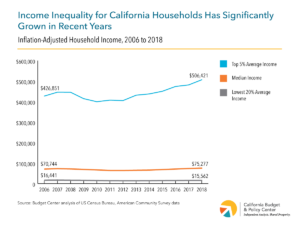 Income Inequality Significantly Increased for Californians in 2018, And Millions of People Can’t Afford Their Basic Needs
Income Inequality Significantly Increased for Californians in 2018, And Millions of People Can’t Afford Their Basic Needs
California Budget & Policy Center
First published September 2019
New Census figures released show rising income inequality across the state and millions of California residents who are struggling to get by on extremely low incomes, while higher-income households experienced more income growth. Even as the latest figures also show there is a decline in the official poverty rate in California, these findings underscore the need for policymakers to ensure that the benefits of California’s strong economy and recent economic growth are shared among all Californians.
The latest Census figures indicate that median household income in California grew to $75,277 in 2018, an increase of 2.3% over the prior year after adjusting for inflation. Median annual earnings for all workers also increased by 0.9% compared to inflation-adjusted earnings in 2017, and a smaller share of Californians were unemployed. These modest economic gains for typical households and workers are encouraging, but must be considered within the broader context of rising inequality within the state over the past several years. From 2006 to 2018, the median household income in California increased by 6.4%, after adjusting for inflation, but the average real income for the lowest quintile of households (those in the bottom 20%) actually decreased by 5.3% – while the inflation-adjusted average income for the top 5% of households increased by 18.6%, or nearly three times as much as the increase in the median income (see Figure 1). At the same time, the cost of living – particularly the cost of housing – has increased much faster than wages for typical workers, as noted in the Budget Center’s report on Supplemental Poverty Measure data released earlier this month. As a result, many Californians with middle and low incomes find themselves unable to make ends meet.
Download Resource